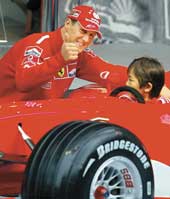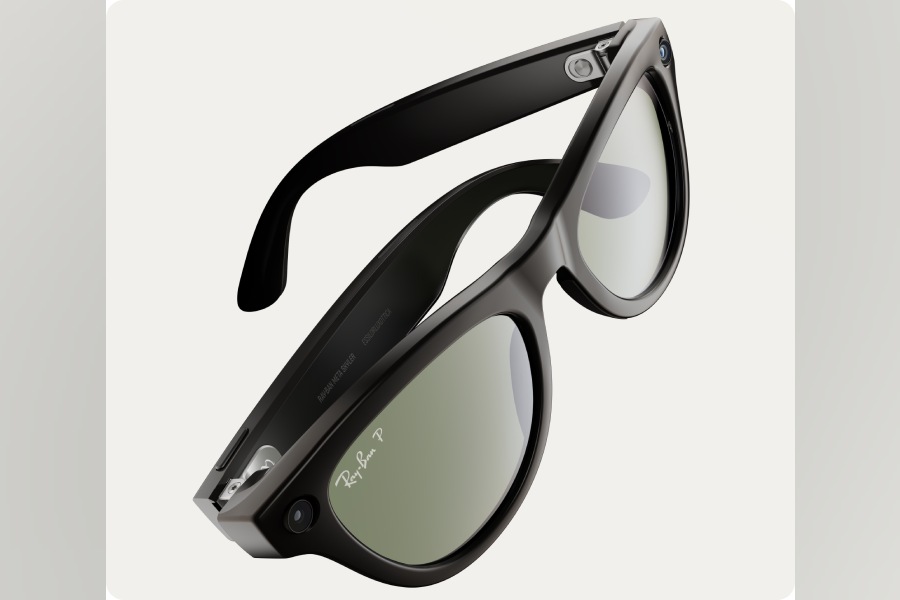 |
| Michael Schumacher obliges a young fan at the Suzuka circuit in central Japan on Wednesday. (AFP) |
Tokyo: Somewhere a celestial flag is surely waving.
Juan Manuel Fangio is about to be overtaken at last, eight years after his death and more than half a century since the driver, many still rate as Formula One’s greatest, claimed his first world title.
Michael Schumacher, who last year linked past and present by equalling the late Argentine’s record of five world championships, looks sure to claim his sixth at Suzuka on Sunday.
The greatest record of all will be surpassed and Fangio’s five will join a list of others left behind by Ferrari’s extraordinary German.
Yet Fangio, who died in 1995 when Schumacher was chasing his second title, will always remain one of the greats, if not the greatest.
“Even if I or someone else can equal or beat Fangio’s record, it still will not compare with his achievements,” was the late Ayrton Senna’s view.
“What he did in his time is something that was an example of professionalism, of courage, of style and as a man, a human being,” he once said.
“Every year there is a winner of the championship but not necessarily a world champion. I think Fangio is the example of a true world champion.”
Jo Ramirez, the former McLaren team co-ordinator who worked with Senna, believed the Brazilian’s ambition was to equal Fangio’s record.
“I think that then he would have retired,” he once said. “He had so much love and respect for Fangio that he wouldn’t have wanted to beat his record.”
But Senna never had the chance. He won three titles before his untimely death at Imola in 1994 stripped Formula One of his genius just as Schumacher was emerging.
Perhaps it is for the best that past and present be clearly defined since Fangio’s era and the modern one bear little comparison.
When Schumacher himself drove a 1951 Ferrari Grand Prix car at Silverstone two years ago, he came away with a new sense of appreciation.
“Really, my compliments to the drivers who went flat out with these sorts of cars, with no seat belts or safety measures,” he said.
Those were the days of oil-streaked faces, of elbows-out gentleman racers in leather goggles, their lightweight helmets and cotton overalls offering scant protection in the event of a crash or, worse still, fire.
Briton Mike Hawthorn, world champion for Ferrari in 1958, used to wear a bow tie when driving.
Yet Fangio, passionate about his sport, was modest about his success: “Seventy five percent of it is the car and the team around it,” he said. “Only 25 percent is the driver and much of that is to do with luck.
“Do you know that in my 10 years of driving in Europe I saw 30 of my friends and rivals killed?”
Friendly tributes
Fangio won the title with four different marques — Alfa Romeo in 1951, Maserati and Mercedes in 1954, Mercedes again in 1955, Ferrari in 1956 and Maserati in 1957 — and rarely had a bad word spoken against him.
The son of a stonemason from a family of Italian immigrants, Fangio was also a good footballer whose nickname ‘El Chueco’ (Bandy Legs) stuck with him.
He made his race debut in Argentina in a modified taxi in 1936 and perfected his skills in long-distance competitions on dirt roads normally used only by bullock carts.
“That taught me about control, gave me the sensitivity to understand a car,” he said. “Driving fast on mud roads, you have to feel the wheels through your backside.”
He moved to Europe in 1948 when he was already 38 and did not retire until he was 46. By then, the amount of respect he had attracted was enormous.
His greatest win was in the 1957 German Grand Prix at the Nuerburgring, coincidentally the circuit closest to Schumacher’s boyhood home.
More than 48 seconds behind Hawthorn and Peter Collins, Fangio broke the lap record 10 times to overhaul the two Britons and win by 3.6 seconds.
“I believe I was inspired that day,” he said. “I never drove quite like that before and never drove quite like that again.”
“He was the one who could always go that little bit quicker, for that little bit longer,” said Stirling Moss, championship runner-up to Fangio three times.
“We certainly didn’t treat him any differently because he was older than us. We looked at Fangio and saw him as a bloody fast driver,” said Moss, now a sprightly 74 and still taking part in historic races.
The Argentine, like Schumacher, also used his head.
“I have never been a spectacular racer,” he said. “If there was some crazy guy around I let him overtake and then tried to follow him, never letting him get out of sight.
“A lot of people would have beaten me if they had followed me. They lost because they overtook me.”
Schumacher, on Sunday, will be the exception.










